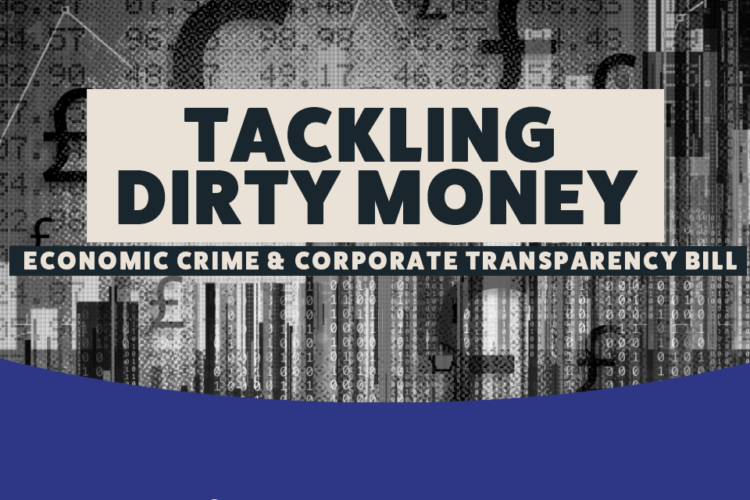By David Young-
The Economic Crime and Corporate Transparency Act has received royal assent, leaving the legal community divided over its potential impact.
The House of Lords gave its final approval to the measure after months of rigorous parliamentary debate, with the government rejecting certain amendments that aimed to close perceived loopholes.
Fraudulent organisations will be removed from the company register under news laws to stop money launderers in their tracks, with their information shared with criminal investigation agencies
Law enforcement agencies will benefit from greater powers to seize, freeze and recover cryptoassets, while groundbreaking legal reforms will allow the courts to dismiss spurious lawsuits which seek to stifle freedom of speech.
Prosecutors will be better able to hold large corporations accountable for malpractice.
These changes will level the playing field for all businesses, ensuring the UK’s open economy remains a world class centre for businesses to grow and prosper.
Home Secretary Suella Braverman said:
‘I am committed to ensuring criminals do not profit from their offending and this landmark act will help law enforcement clampdown on the tactics they use.
‘It will have a big impact on our ability to fight organised crime, including terrorist funding, fraud and money laundering, and that will ultimately help keep us all safe.
Business Minister Kevin Hollinrake said:
‘We’re providing Companies House with the tools to take a much harder line on criminals who take advantage of the UK’s open economy, ensuring the reputation of our businesses is not tarnished by the UK playing host to the world’s scammers.
‘These reforms will remove the smoke and mirrors around companies hiding behind false identities, provide further protection to the public from companies fraudulently using their addresses, and deliver better data to support business and lending decisions across the economy, enhancing the UK’s reputation as a great and safe place to do business.
Lord Chancellor Alex Chalk said:
‘We will not stand by while wealthy individuals abuse our courts with malicious lawsuits designed to gag reporters exposing their misconduct.
This act reinforces our unwavering commitment to protect freedom of speech, and end the brazen exploitation of our legal system by corrupt elites.
The powers given to Companies House form the biggest shakeup to the service in its 180-year history.
Once the powers come into force, the agency will take immediate steps to improve the quality of information on the company register.
Invalid registered office addresses, such as those used fraudulently to set up companies, will be removed.
Verification checks will assess the identities of people setting up and managing companies, stopping criminals hiding behind false names or registering companies with fictional characters.
‘This will help prevent fraudulent appointments and avoid people involved in money laundering hiding behind false names.
Changes to public beneficial ownership registers will also close loopholes that allow corrupt actors to use opaque companies to move and hide money.
It will additionally provide businesses with greater clarity on who they are working with, while allowing civil society organisations to expose corrupt actors, and for the public to increase their trust in governments.
Tackling illicit finance is a global issue with 30 other countries, including Nigeria and France, having public registers of beneficial ownership. Canada, Australia, and New Zealand are also implementing their own commitments.
Lord (Tariq) Ahmad of Wimbledon, Minister of State for Middle East, North Africa, South Asia, United Nations and the Commonwealth said:
‘Tackling illicit finance requires global cooperation and the UK will continue to work with our international partners to strengthen their registers of beneficial ownership, to reduce money laundering, create a level playing field for businesses and bolster national security.
One of the significant provisions in the Act is the introduction of the failure to prevent fraud offense.
While this new route to attributing corporate liability was initially proposed for both large and small companies, it has been limited to large enterprises following the rejection of Lords amendments.
Lewis also highlighted the long-awaited amendment to the identification doctrine, which should make it easier for enforcement agencies to attribute liability to corporations through the actions of senior managers.
Lloyd Firth, counsel in international firm WilmerHale’s UK white-collar defense and investigations practice, emphasized the importance of this legislation but cautioned that its true impact may not be felt for several years. He drew parallels with the Bribery Act, where a significant lag time preceded the first significant enforcement actions.
Critics of the Act argue that it falls short in several key areas. They lament the government’s rejection of amendments that sought to hold senior executives directly liable for economic crimes committed by their organizations and to introduce a new offense for corporates failing to implement adequate anti-money laundering measures.
Sir Bob Neill MP, chair of the Commons justice committee, stressed the importance of having control over individuals in smaller companies, through which fraud and illicit activities are often channeled. Dame Margaret Hodge MP, chair of the all-party group on anti-corruption, expressed disappointment that trusts were not adequately covered in the Act and voiced concerns about the potential efficacy of the corporate register.
Jane Larner, counsel at Linklaters, said, “The act’s supporters say it will be a game-changer in the fight against economic crime in the UK, but its efficacy will come down to enforcement. We expect increased enforcement activity, with authorities under considerable pressure to demonstrate effective implementation of the new offenses. However, the refusal to extend the corporate failure to prevent fraud offense to SMEs may weaken the Act’s impact from the start.”
The Economic Crime and Corporate Transparency Act’s implementation has sparked controversy, with proponents seeing it as a significant step in tackling economic crime, while critics argue that it misses the mark in some critical areas. The true impact of this legislation is likely to become clear only after a few years of enforcement actions and legal adjustments.




